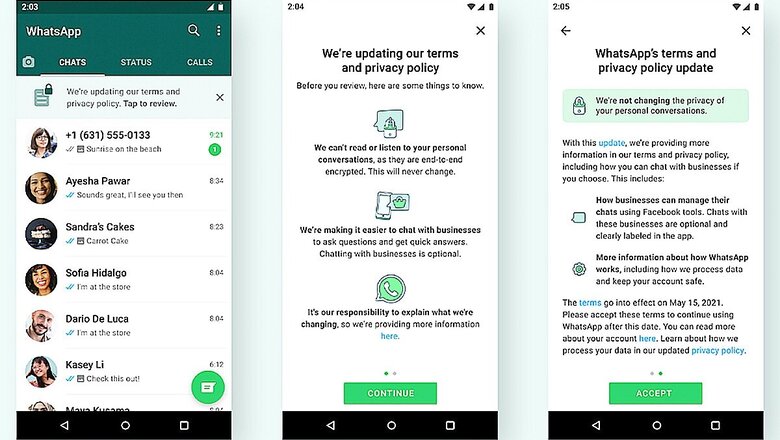
views
There is no getting around this. WhatsApp is making some pretty big changes to its privacy policy which you now have to accept, if you are to continue using the messaging app. You now have a clearer picture of how much of your data is being shared. In the new privacy policy and terms of use, which WhatsApp simply calls “update”, the Facebook-owned app details how WhatsApp’s service handles your data as well as how WhatsApp partners with the larger Facebook platform to allow integrations across multiple apps, including Instagram and Facebook Messenger. Three large buckets under which the new terms have been categorized. How businesses can manage their chats using Facebook tools, more information about how WhatsApp works including how your data is processed and illustrations of how your data ties in with the larger Facebook app ecosystem requirements called “how we work with Facebook”.
Have you accepted the new privacy policy? WhatsApp says that for anyone who still hasn’t accepted their new terms of service, which WhatsApp calls “update”, they will first be sent persistent reminders to accept the new terms to use the app. While there is no specific window mentioned for the duration these persistent reminders would last or how persistent they would be, WhatsApp says that if you still don’t accept, there will be consequences. Till you accept. First, your access to the chat list within WhatsApp will be restricted, which means you won’t be able to see messages in what is essentially an instant messaging app. If you have notifications enabled on your phone, you’ll be able to see incoming messages in the notification itself and reply from there. You’ll able to answer incoming WhatsApp voice and video calls for the time being. While all this is playing out, let us take a look at what has unfolded so far and how we have reached this point in time, where WhatsApp’s new privacy policy is the cause for such a debate.
India Has Asked WhatsApp Again To Take Back The ‘Discriminatory’ Policy
The Ministry of Electronics and Information Technology has once again directed Facebook-owned messaging platform WhatsApp to take back its new Privacy Policy. In a communication sent to WhatsApp on 18th May, 2021 the Ministry has once again told WhatsApp to withdraw its Privacy Policy 2021 as the changes to the Privacy Policy and the manner of introducing these changes including in FAQ undermines the sacrosanct values of informational privacy, data security, and user choice for Indian users and harms the rights and interests of Indian citizens.
Read More: IT Ministry Asks WhatsApp to Take Back New Privacy Policy Again; Case Under Trial in Delhi HC
Telegram and Signal See 1,200% Growth, Thanks To WhatsApp
It is surely no surprise that users who weren’t in any mood to give in to WhatsApp’s new privacy policy so easily have been trying every which way possible to find an alternative instant messaging app that doesn’t use their data so generously. According to numbers by research firm SensorTower, Telegram and Signal, which are seen as WhatsApp’s biggest rivals, witnessed nearly 1,200 percent growth ahead of the belatedly implemented privacy policy deadline on May 15. Numbers suggest that Telegram’s downloads on Android and iOS grew 98 percent year-over-year (YoY) to more than 161 million, while Signal saw its first-time downloads surge 1,192 percent YoY to 64.6 million between January to April 2021.
Read More: Telegram and Signal Saw Nearly 1,200% Growth Ahead of WhatsApp’s New Privacy Policy Deadline
The Courts Sought What The Government Thinks Of WhatsApp’s New Policy
The Delhi High Court has sought a response from the Government of India, for a plea challenging the new privacy policy that WhatsApp implemented on May 15. A bench of Chief Justice D N Patel and Justice Jyoti Singh issued notices to the central government as well as WhatsApp and parent company Facebook, for responses as it hears a petition which challenges the new policy and says it violates users’ right to privacy under the Constitution of India.
Read More: HC Seeks Stand of Centre, Facebook, WhatsApp on Plea Against New Privacy Policy
The Government’s Views Are Very Clear: This Is A Violation Of IT Laws
The centre told the Delhi High Court that it views the new privacy policy of WhatsApp as a violation of the Indian Information Technology (IT) law and rules, and sought directions to the social media platform to make it clear whether it was confirming to the same. WhatsApp told the bench that while its new privacy policy has come into effect from May 15, it would not start deleting accounts of those users who have not accepted it and would try to encourage them to get on board.
Read More: WhatsApp’s New Privacy Policy Still Violates India’s IT Laws: Govt to Delhi High Court
Much Ado About Nothing? Actually, No. WhatsApp’s New Policy Is A Big Deal
May 15. The day when the new WhatsApp privacy policy finally came into effect. WhatsApp is making some pretty big changes to its privacy policy and the terms of service, if you are to continue using the instant messenger. This was first teased earlier this year but pushed back after vociferous criticism from users. The Facebook-owned instant messenger details how WhatsApp’s service handles your data as well as how WhatsApp partners with the larger Facebook platform to allow integrations across multiple apps, including Instagram and Facebook Messenger. WhatsApp says that they collect user information to be able to provide services and customize the experience for the user.
Read More: Did You Get A New WhatsApp Privacy Policy Popup? More Clarity On Your Data Usage, But That’s About It
You Have Many Questions, Don’t You? We Try To Answer As Many As We Can
The new WhatsApp privacy policy makes it very clear that your data is collected and what all is it used for regarding what is actually is collected, how they collect your location information, how everything ties in with other Facebook services and what Businesses on WhatsApp can do with your data. WhatsApp makes it clear that they do share information with other Facebook companies. Some of the data that’s collected includes your mobile phone number and your profile name to create and run a WhatsApp account, your location information at all times, IP addresses and other information like phone number area codes to estimate your general location and businesses on the platform can share your information with third-party service providers.
Read More: WhatsApp’s Update Policy To Appear As In-App Banner: All Your Questions Answered About New Terms
What If You Haven’t Accepted WhatsApp’s New Terms Of Friendship, Just Yet?
The implementation of the much-criticized WhatsApp privacy policy was significantly delayed because of user feedback yet has still been pushed through. Albeit with one tiny change. No, nothing within the privacy policy has really changed, except that the Facebook owned WhatsApp wont simply delete your WhatsApp account if you don’t accept it. Instead, you’ll still lose a whole lot of functionality instead at some point. This includes periodic added restrictions of access to your chat list, notifications and calls. And it’ll be a slow lockdown of how you access WhatsApp. Designed to perhaps make you eventually give up?
Read More: WhatsApp’s Much Criticized Privacy Policy Kicks In Tomorrow: If You Don’t Accept, This Is What Happens
Had Enough And Don’t Have The Energy To Deal With This Complexity?
The WhatsApp privacy policy is very much here to stay, and chances are, you’d have been prompted in the past few hours to accept. If you haven’t already The latest from the Facebook-owned WhatsApp is that while they won’t rudely delete your WhatsApp account if you don’t accept the privacy policy, you’ll still lose a whole lot of functionality instead, till you accept. This includes periodic added restrictions of access to your chat list, notifications and calls. Here is how to delete your WhatsApp account.
Read More: Want To Delete WhatsApp And Don’t Wish To Accept The New Update? This Is What You Need To Do
Nothing To See Here! WhatsApp Basically Blames You For Falling For Misinformation
After what was a massive PR disaster, WhatsApp tried to do damage limitation by pushing back the implementation of the new privacy policy and terms of use. But not before the Facebook-owned WhatsApp made it clear in an official statement that pretty much puts the blame, and indeed the onus on us as users—apparently thousands, if not millions, of users around the world are confused and misinformed about the update, and hence the confusion and misinformation. Apparently, there was nothing ever to be worried about.
Read More: WhatsApp Blames You For Falling For Misinformation, But Can It Keep Brushing Things Under The Carpet?
Read all the Latest News, Breaking News and Coronavirus News here. Follow us on Facebook, Twitter and Telegram.

















Comments
0 comment